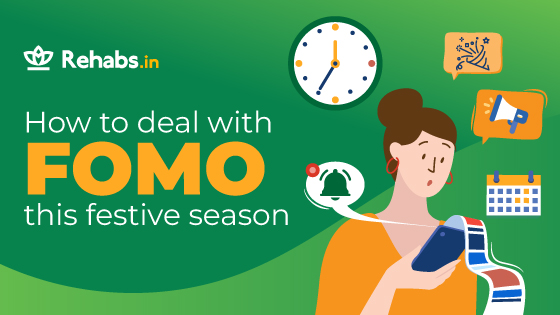How to deal with FOMO this festive season

Festivals are a time for friends and families to come together and celebrate their culture with joy. When we hear the word ” festivals”, holidays, bonding with families, rituals, gifts, good food, lights, fireworks, and a joyous time come to mind. However, festivals can be quite stressful for some.
In India, over 50 festivals are celebrated in different states and ethnic groups. Most festivals around the world fall between October-December. These months are filled with excitement. Let’s see how festivals can sometimes affect your mental health and what you can do to prevent it.
Loneliness
Across the globe, festivals are synonymous with family gatherings. But in today’s busy world, people are occupied with their jobs and colleges and often live away from their families. During festivals, people are likely to feel more lonely, depressed and anxious. Seeing their friends celebrate with their families can trigger a fear of missing out (FOMO).
FOMO
FOMO is a feeling that other people are having a better time and have a better life than them in general. This feeling that they are missing out on better opportunities and a better life makes people feel dissatisfied, anxious and depressed. A major trigger for FOMO is social media. Seeing endless posts of other people doing different things can make you feel inferior about yourself.
Stress
If you live in India, you might be familiar with the additional responsibilities that come with festivals. From making a load of food and snacks, shopping for gifts and clothes, to deep cleaning and decorating the whole house. This can often cause anxiety and exhaustion.
Festival Blues
While festivals bring a feeling of togetherness and love, some people might experience festival blues. This is a term used to describe feelings of anxiety, sadness and depression during the time of festivals.
For people with pre-existing mood or anxiety disorder, festivals can sometimes trigger another episode. Dr Alpes Panchal, a renowned psychiatrist from Mumbai, describes this as a feeling of ‘what do I have to celebrate about?’. This might also affect their sleep and appetite.
Women
Most of us have seen our mothers work like they have superpowers during festivals. Making loads of food, hosting guests, cleaning the house, and taking care of everyone. As much as they look forward to these festivals, you can see the exhaustion on their faces. Or, if you are a mother yourself, you know how strenuous it can be, both physically and mentally.
Some signs to look out for:
Festivals might add extra pressure for you to be happy while dealing with so many other things. Here are some signs that can indicate that your mental health might be getting affected:
- Physiological symptoms like headaches, backache
- Disturbance in your sleep
- Stomach issues
- Social isolation
- Poor self-care
- A general disinterest in everything
- Disproportionate anxiety or anger
What can you do about it?
There is a lot to do during festivals, social gatherings or family functions, and it can get stressful. It is important to manage this stress and take things one step at a time. You can try to incorporate some of the following:
Taking things slow.
Yes, although there is a lot to do in little time, it is important to plan realistically. Set small goals and do not set unrealistic expectations. Also, set some ground rules to ensure you don’t over-exert yourself.
Self-affirmations
At a time when everyone is posting about how they are preparing or celebrating their festivals or special occasions, it is easy to feel FOMO. While comparing your life with others, you might downplay your own life. Self-affirmations can help remind you of your own self-worth.
Relaxation
Using some breathing or relaxation techniques can help ease the stress in just a few minutes. A simple breathing exercise is the 4-7-8 method. Breathe in through your nose for 4 seconds, hold your breath for 7 seconds and breathe out through your mouth for 8 seconds as if you’re blowing a candle. You can do this 6-8 times. You can also use some guided relaxation or grounding exercises.
Taking time off social media
A major trigger of FOMO is social media. While you are happy to see your friends celebrate with their families, buy fancy things and post aesthetical pictures, it may make you feel anxious and unsettled if you start comparing them with yourself. Taking some time off social media can help you really connect with your family this festive season.
Sticking to your routine
Continuing your routine as you would on any other day can give you a sense of control. Changes in sleep or eating patterns can affect your mood. Try to consume more probiotics so you can keep your gut healthy. This boosts serotonin and will keep you uplifted.
Engage in a hobby
It is possible that you’re unable to go to your family this time. This is an opportunity to connect with yourself if you’re by yourself. Celebrate yourself with something you enjoy doing. You can also start a new hobby or a holiday ritual for yourself.
Spending time with yourself and your loved ones
With an endless to-do list and a limited time, you might forget the real purpose of festivals. It’s to bring you closer to your loved ones and celebrate life. So take some time off from the chores and spend time with yourself and your loved ones.
You can always speak with a mental health professional if you experience anxiety or mood changes around the festive season. This can help you manage your symptoms if it’s getting in the way of your day-to-day functioning.
In India, there is still some stigma around mental illnesses. If you want to support others during this festive season, show your support to the people around you. Start a conversation about festive blues and ask how your friends and family are feeling. Accept that even though it’s considered a “happy-fun” time, it might not always be so, and that’s okay.
Sources:
Appleton, J. (2018). The Gut-Brain Axis: Influence of Microbiota on Mood and Mental Health. Integrative Medicine, 17(4), 28–32. https://pubmed.ncbi.nlm.nih.gov/31043907/
Chandani, P. (2019, September 8). Beat the festive blues. The Asian Age. https://www.asianage.com/life/more-features/080919/beat-the-festive-blues.html
Roberts, J. A., & David, M. E. (2020). The social media party: Fear of missing out (FoMO), social media intensity, connection, and well-being. International Journal of Human–Computer Interaction, 36(4), 386-392. https://doi.org/10.1080/10447318.2019.1646517













